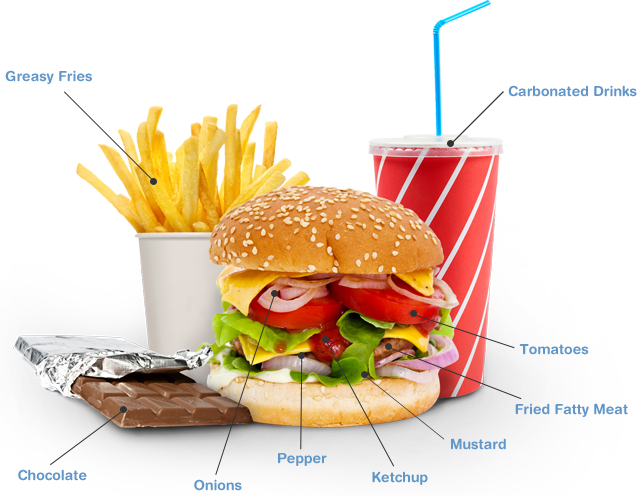
The main cause of GERD is an incompetent lower esophageal sphincter (LES), which allows gastric contents and enzymes to backflow into the esophagus. As a result, corrosive gastric contents irritate lining of the esophagus. If this condition is chronic and untreated, it leads to inflammation, breakdown and long-term complications, including adenocarcinoma of esophagus (a type of esophageal cancer).
Contributing risk factors of GERD are: obesity, pregnancy, constipation, and overfilling of the stomach. Excessive ingestion of spicy foods, tomatoes, garlic, onions, chocolate, citrus juices, fatty foods, and alcohol also contribute to lower esophageal sphincter (LES) relaxation and regurgitation. Smoking is another contributing factor toward the development of GERD. It stimulates the stomach to release acids and causes LES to open more often.
The primary treatment of GERD is diet and lifestyle modifications. However, there are medications that may help reduce the symptoms. For example, antacids (Mylanta) neutralizes excess stomach acid and Histamin2 Receptor Antagonists (Zantac, Pepcid), or Proton Pump Inhibitors (Protonix, Prilosec, Nexium) reduce secretion of stomach acid.
Tips to Prevent GERD:
- If you are obese, start a diet/exercise program to lose weight. This will decrease pressure on your stomach and in turn on LES.
- Eat smaller portions to prevent overfilling your stomach.
- Avoid eating late meals and going to sleep with a full stomach.
- Avoid foods that trigger your heartburn.
- Do not exercise with a full stomach. Wait at least 2 hours after a meal before going to the gym.
- Engage in a smoking cessation program.
- Consult your physician about medications you are taking. Some of them, like aspirin, ibuprofen, and some birth control and blood pressure pills may be a reason for your heartburn. Do not stop medication on your own; ask your doctor if there is a different one, with lesser side effects.
GERD Trigger Foods:
- Acid containing foods – citrus fruits and juices (grapefruit, orange, pineapple, tomato)
- Refined carbohydrates
- Food additives
- Too much sugar
- GMO foods (some are: corn, soybeans, canola oil, cottonseed oil, papaya and alfalfa)
- Heavy to digest foods
- Coffee (regular and decaffeinated)
- Caffeinated soft drinks
- Tea
- Other caffeinated beverages
The information provided is for general interest only and should not be misconstrued as a diagnosis, prognosis or treatment recommendation. This information does not in any way constitute the practice of medicine, or any other health care profession. Readers are directed to consult their health care provider regarding their specific health situation. Marque Medical is not liable for any action taken by a reader based upon this information.


